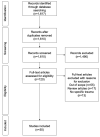Simulation-Based Education in Trauma Management: A Scoping Review
- PMID: 36294122
- PMCID: PMC9603596
- DOI: 10.3390/ijerph192013546
Simulation-Based Education in Trauma Management: A Scoping Review
Abstract
Trauma injuries are an important healthcare problem and one of the main leading causes of death worldwide. The purpose of this review was to analyze current practices in teaching trauma management using simulations, with the aim of summarizing them, identifying gaps and providing a critical overview on what has already been achieved. A search on the Web of Science website for simulation-based trauma training articles published from 2010 onwards was performed, obtaining 1617 publications. These publications were screened to 35 articles, which were deeply analyzed, gathering the following information: the authors, the publication type, the year of the publication, the total number of citations, the population of the training, the simulation method used, the skills trained, the evaluation type used for the simulation method presented in the paper, if skills improved after the training and the context in which the simulation took place. Of the 35 articles included in this review, only a few of them had students as the target audience. The more used simulation method was a high-fidelity mannequin, in which the participants trained in more technical than non-technical skills. Almost none of the studies introduced an automated evaluation process and most of the evaluation methods consisted of checklists or questionnaires. Finally, trauma training focused more on treating trauma patients in a hospital environment than in a pre-hospital one. Overall, improvements in the evaluation method, as well as in the development of trauma training on undergraduate education, are important areas for further development.
Keywords: clinical simulation; education; trauma management.
Conflict of interest statement
The authors declare no conflict of interest.
Figures



References
-
- World Health Organization. Injuries. 2021. [(accessed on 2 June 2021)]. Available online: https://platform.who.int/mortality/themes/theme-details/mdb/injuries.
-
- Lin H.-L., Chen C.-W., Lee W.-C., Kuo L.-C., Cheng Y.-C., Lin Y.-K., Lin J.-N., Chan H.-M. Effects of the Emergency Trauma Training Course on the Confidence of Final-Year Medical Students Dealing with Trauma Patients. Kaohsiung J. Med. Sci. 2009;25:10–15. doi: 10.1016/S1607-551X(09)70034-8. - DOI - PMC - PubMed
Publication types
MeSH terms
LinkOut - more resources
Full Text Sources

